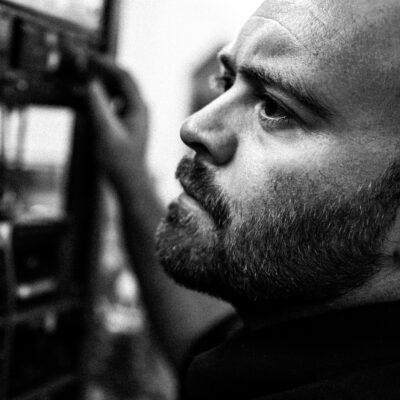Postdoc Spotlight: Zachary Ulibarri

September 29, 2023
Zachary Ulibarri is a postdoc in mechanical and aerospace engineering from Albuquerque, New Mexico. He holds a Ph.D. in physics from the University of Colorado, and his research at Cornell focuses on instruments that study biomolecules to search for signs of life in space. He is a recipient of a Postdoc Achievement Award for Excellence in Community Engagement as part of Cornell’s celebration of National Postdoc Appreciation Week 2023.
What is your area of research, scholarship, or work and why is it important?
There may be bacterial alien life thriving in the water oceans under the ice crusts of Europa or Enceladus. However, one of the best instruments we have on Earth to study biomolecules to search for signs of life, the electrospray mass spectrometer, doesn’t work in space. We’re building one that does.
One of the most important advantages of electrospray spectrometers is that they’re very gentle and don’t fragment the biomolecules as they’re being studied. Our very exciting initial results show that our system, which works in the vacuum of space, is likewise very gentle and can detect amino acids, the building blocks of DNA, even at trace levels!
What are the broader implications of this research, scholarship, or work?
Our new type of electrospray mass spectrometer could one day find signs of alien life. It’s hard to overstate how important that is.
Even so, another benefit of our system is that it can be miniaturized very easily compared to typical laboratory electrospray spectrometers. Thus, even though our prime goal is detecting alien bacteria, we also think this system could be extremely useful for mobile earth-based laboratories that can study biomolecules and other organics on a truck-mounted chassis. This could bring a very powerful tool to bear in real-time field studies, which otherwise would have to send samples back to a laboratory somewhere else.
What does receiving a Postdoc Achievement Award mean to you?
My grandfather had only a sixth grade education, but I nonetheless count him a genius. He creatively solved the biggest problem facing his family: how to escape the Hispanic slums and secure a good education for his son, my father. His solution was to take a job as a custodian in Los Alamos, where there were no slums they could push him off to but that had excellent schools because of all the physicists living there. Now, 70 years later, I think he would be very proud to see his grandson get an award at an Ivy League, but he’d also laugh and shake his head that I’ve become one of those forgetful, out-to-lunch physicist-types. Cheers to Florentino!
What hobbies or activities do you enjoy in your spare time?
I love photography, as evidenced by the multitude of photo albums I have on my website. I especially love marrying photography with my other hobbies, like hiking, going to go experience live music, and travel. For hiking, I built a camper bed platform for my car so that I can drive to the trailheads in the Adirondacks, the Greens, or the Whites to sleep, wake up with the sun, and go hiking first thing in the morning.
I don’t ride as much as I used to, but I also have a love of bicycles. In the summer before grad school, I rode a mountain bike from Virginia to Oregon. I lost 40 pounds.
Why did you choose Cornell?
I chose Cornell because the project that I am able to work on is super cool, my advisor, Prof. Elaine Petro, is super cool, and my labmates are super cool. On top of that, there are a lot of different and capable departments for unique crossover experiments. The access to world-class laboratory equipment and leading expertise in a wide range of fields isn’t easy to come by in many places that have a small-town feel like Ithaca does.
What is next for you?
I am trying to decide if I want to stay in academia or go out into industry. But I also think a lot about becoming a brewer or a woodworker or a full-time photographer, so who knows? Either way, I think I shall have to return to New Mexico before too long. I miss the mountains and the green chile.
Do you have any advice for current graduate students?
Grad school is hard. There is no way around that. You should be working hard a lot of the time. But you shouldn’t be working hard all of the time. You’re in your twenties. Enjoy it, kid. Go outside. Listen to some live music. Hike Mount Washington. Drink a beer. Read a book (not one about work). Enjoy the autumn color change. Learn to rock climb. Lift some weights. Do some of this some of the time, and both life and grad school will be much better.
